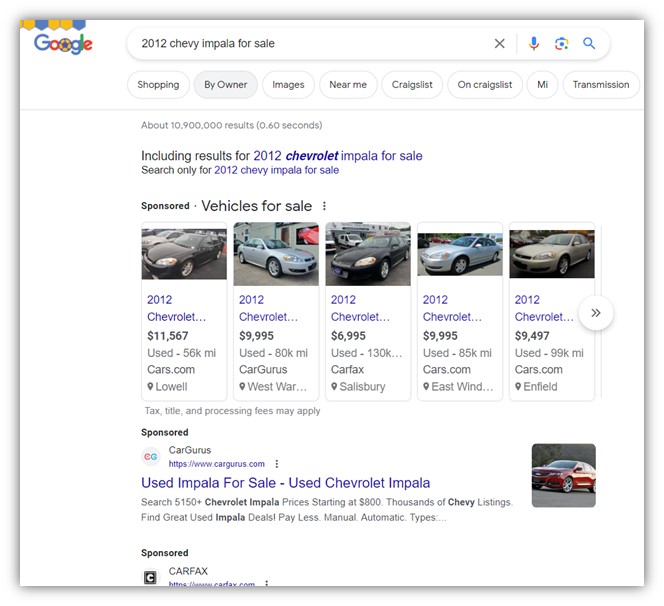Vehicle ads are still a relatively new ad format to both Google Ads and are not currently available to all advertisers.
Google vehicle ads best practices
Google vehicle ads provide you with opportunities to increase car sales and visibility on the SERP. But make sure that you set these campaigns up for success. Check out these Google vehicle ads tips.
1. Track only meaningful actions as conversions from your vehicle detail pages
A vehicle detail page view in itself can sometimes be a goal in your campaigns, but mind that every click from your vehicle listing ads will land on the VDP—so VDP views are a very poor metric to evaluate the success of these campaigns. Instead, track higher intent actions like form fills, phone calls, and chats as conversions in these campaigns.
![]()
Performance Max campaigns are designed to maximize the conversions that they generate, so make sure that the data they have to optimize for is only from highly valuable leads!
2. Budget for success
Although you can run vehicle listing ads on any kind of budget—these fully automated ad campaigns can take a lot of data to perform well and consistently. Google recommends local dealerships budget $100/day for a vehicle ads campaign, or $3,000 a month. More reach, traffic, and conversions come at larger budgets–and while you may be able to spend less than the recommended amount for these campaigns, it’s foolish to budget less than $1,000 a month for vehicle listing ads.
3. Optimize your inventory feeds
Nearly all of the data that triggers and compiles your Google vehicle ads come from your inventory feeds—so continue to focus your optimization on these attributes. Although Google may only require a handful of attributes in your feed to run, these optional attributes can help Google better understand your inventory and find relevant searches to match it to.
Remember, without keywords in your VLA campaigns, all the keywords that Google is going to match your ads to are going to come from your feed. Make sure that you use concise and relevant language in your feed to best target your cars to users based on their search terms. Avoid verbose or language unrelated to the specific car on your car’s description page.

WordStream’s Free Keyword Tool can help you identify which terms to use when optimizing your Google vehicle ads.
4. Take control of your campaign structure
Many dealerships are tempted to run one vehicle ads campaign with all of their inventory in the same product group. While this isn’t strictly bad from Google’s perspective—it’s likely that you have different goals and KPIs to hit based on the inventory you have on the lot.
You may, for instance, have additional co-op budget to promote new cars. If you want more control of the spend and performance of your vehicle listing ads, break them into separate campaigns based on attributes like new/used/CPO, make, model, or price. This way, you can control how much budget you’re providing to each group of inventory and optimize it towards a profitable cost per conversion.
5. Own the SERP with both vehicle ads and search ads
Vehicle listing ads can be a great tool for local car dealers to showcase their inventory on Google—but they’re not designed to replace your traditional search ads. Not only do search ads still show alongside vehicle ads on the same SERP, but text-based ads are still much more flexible and have more reach for relevant searches.
Both your vehicle ads and regular Google ads may appear when a user first starts searching for a “2017 Chevy Cruise,” but if you want to show for the searcher looking for a “Chevrolet dealership near me,” you’ll still need to have a robust search campaign built out to capture that high-intent search.

Notice how the brands CarGurus and Carfax have both vehicle ads and search ads in this SERP instance.
Try Google vehicle ads today for increased sales tomorrow
Google vehicle ads are a great format for local dealerships to reach car shoppers on and off the SERP. Combined with a great search campaign, dealers can reach a wide range of highly relevant searches for the inventory that they currently have on their showroom floor at a low cost!
To recap, here are the top tips for getting started with Google vehicle ads:
- Track only meaningful actions from your VDPs
- Budget for success
- Optimize your inventory feeds
- Take control of your campaign structure
- Use SERP ads in unison with vehicle listing ads


0 Comments